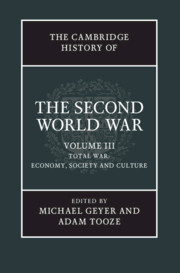Crossref Citations
This Book has been
cited by the following publications. This list is generated based on data provided by Crossref.
2015.
Other Books Received.
The American Historical Review,
Vol. 120,
Issue. 4,
p.
1592.
Alieva, Liudmila V.
Antonova, Lidia V.
and
Khrishkevich, Tatiana G.
2019.
Contemporary historiography on the phenomenon of the social cohesion in the period of the Second World War.
Journal of the Belarusian State University. History,
p.
7.
Fennell, Jonathan
2019.
Fighting the People's War.
Bottelier, Th. W.
2020.
‘Not on a purely nationalistic basis’: the internationalism of Allied coalition warfare in the Second World War.
European Review of History: Revue européenne d'histoire,
Vol. 27,
Issue. 1-2,
p.
152.
Winter, Jay
2022.
The Cultural History of War in the Twentieth Century and After.
Henriques, Francisco
2023.
Portugal na Segunda Guerra Mundial: neutralidade e comércio estratégico de conservas de peixe, 1939-1945.
Ler História,
Vol. 82,
Issue. ,
p.
239.
Bottelier, Th. W.
2023.
The maritime perspective: Placing the oceans in the study of the Second World War.
Journal of Strategic Studies,
Vol. 46,
Issue. 2,
p.
451.
Thompson, Matthew
2024.
Empire and the Rhetoric of Total War in Zadie Smith’s White Teeth
.
Twentieth Century Literature,
Vol. 70,
Issue. 3,
p.
261.
Bret, Patrice
2024.
Global History of Techniques.
Vol. 9,
Issue. ,
p.
581.
Glover, Nikolas
Arnberg, Klara
and
Cottrell-Sundevall, Fia
2024.
The making of consumer patriotism: mobilizing Christmas in Sweden during the Second World War.
History of Retailing and Consumption,
Vol. 10,
Issue. 3,
p.
225.
Edgerton, David
2024.
The United Kingdom's disappearing wartime imports 1939–45: A statistical, ideological, and historiographical accounting.
The Economic History Review,
Vol. 77,
Issue. 1,
p.
119.



